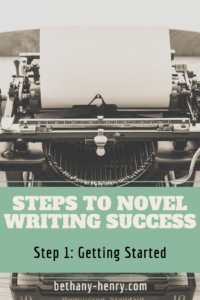So you’ve decided you want to write a book.
Congratulations! I’m excited for you! That declaration is the first step of a glorious and complicated (and gloriously complicated) journey.
So where do you begin?
Some people immediately grab some paper and throw words on a page. After all, if you’re a writer you should be writing, right?
Well… yes and no.

Most people’s first drafts fizzle out after the initial excitement fades and the story idea is no longer shiny and new. Characters fall apart. Plots aren’t what they seemed to be. And suddenly we’re left five chapters into our story wondering what happened.
Just writing isn’t enough.
We don’t want to set ourselves up to run out of steam half way. We don’t want our story to breakdown and collapse.
Instead we want to set ourselves up for success. We want to bend the odds in our favor. We want to get all our ducks in a row (or at least some of them!) so that we can be working toward a finished book instead of a disorganized jumble.
Instead of jumping into our story immediately we can help both ourselves and our story by taking some time to prepare well.
A little bit of planning can go a long way.
This post is Part 1 of the Steps to Success series designed to walk us through the process of writing a novel from beginning to end. As always, personal preferences and experiences differ. This guide is based in part on my own experiences as well as from authors I have worked with and/or learned from along the way.
Writing a novel is doable. You don’t need to be a creative arts major at a fancy school or a tweed wearing individual who only uses a typewriter. (Though I have nothing against tweed just for the record.) Please please just be yourself.
Because you can do this.
So let’s break it down a bit. Where do we start? What needs to be accomplished before jumping in to start our first draft?
1. Decide To Write
Check this one off the list! If you’re reading this now (and I’m assuming that you are…) chances are you’ve already decided you want to write a novel. This is the start of your great adventure!
2. Evaluate Your Goals For Writing
This is your chance to do a bit of soul searching because your motivations for writing will influence what our end goal will be.
For example: If you want to write in order to share stories with your children at bedtime, your end goal may be to compile some short stories and print them out for your family.
If you want to write in order to sell your work and financially support your family it may require a different approach to writing.
There are dozens of reasons why you may decide to write and there aren’t specific “right” answers you need to be coming up with. But it is worth taking at least a few moments and think about why you are seeking to start this project.
Great novels don’t get written by accident. It’s going to take work and time and a even more work. So it’s important to know why you are undertaking this project.
You don’t need to have your five year (or even five day) plan all settled at this point or make any decisions regarding self published, traditional publishing etc etc. But it’s worth it to take at least a few minutes to clarify your thoughts regarding the direction of the project you’re starting.
 3. Brainstorm
3. Brainstorm
Now that we’ve given some thought to why we’re writing it’s time to think about what it is we’re writing.
Maybe you already have an idea for your novel. Great!! Write it down.
Our minds are tricky and treacherous places filled with memory loss and confusion. Because of this, it’s incredibly important to write ideas down as soon as possible and be careful in what notes you throw away. I hate it when I had a perfect idea that I can’t remember the next day! Learn from my mistakes and don’t let that happen to you 😉
If you didn’t come to this post with a story idea in place, that’s totally fine! Now is the time to think about what you may want to write about. What stories excite you? What questions do you want to explore in your writing? What characters are bouncing around in your mind?
(If this is where you’re at, stay tuned for my post on story prompts coming soon!)
You don’t need to have everything figured and fleshed out at this point, just a basic idea is fine. A starting point basically to bring us to…
4. Freewrite
Take your shiny new story idea and write about it.
What do you like about it, what does it make you think of, what questions does it make you ask yourself? What characters are there? What does the world look like? What could make things harder for your main character? What lessons do the characters need to learn? What are their motivations, their dreams, their struggles? What makes them imperfect? What makes the world interesting?
Take ten minutes, an hour, whatever time you have, and just write.
See what questions you can answer or what new questions you come up with. You don’t need to have everything tidy and figured out at this stage. The point is to dig a bit deeper into your idea and see what direction the story may go in. You may see certain themes cropping up or noticing ways characters or plot elements may work together.
Hurrah for you! You’re creating fodder to strengthen your story and give it richer depths.
Note: If you find you’re already bored with your idea after this exercise then you may want to either find a way to tweak your concepts a bit or you can always revisit the brainstorming step and come up with something else you’re more passionate about.
5. Things You Like/Summary
It’s time to finish the starting stage of writing your story.
Take your scattered thoughts and themes from your freewriting and see about pulling them together to some sort of cohesive storyline.
Who is/are the main character/s and what do they want?
What/who keeps them from getting what they want?
What world do they live in?
What flaws do the characters have and how do they change over the course of the story?
Ideally at this point you’ll have the bare bones concept of where you want to go with your novel. (Though I promise you’ll have time to change it later on as needed!)
See if you can summarize your rough story idea into a few sentences or a short paragraph. This summary will guide you as you move forward and give you something to look back at to keep your story focused and cohesive.
And there you have it folks! In a few steps you’ve decided why and what you want to write! These may (and probably will) change a bit along the way but you have a solid start to build on.

Give yourself a high five and be proud! Yes those fireworks are for you 😉 You’re off to a great start and looking good as you begin writing your book!
Next you should take a look at Steps to Success Part 2: Developing Content.
Are you starting your book and excited about it? Share your story summary below!




